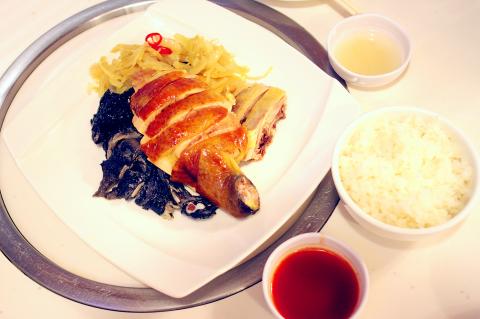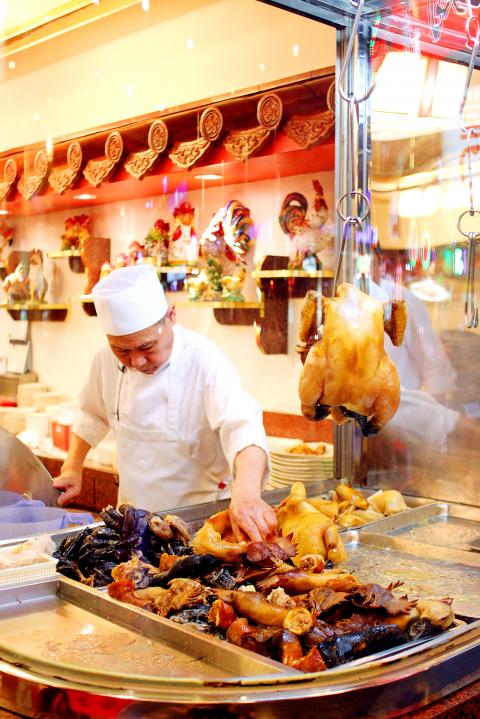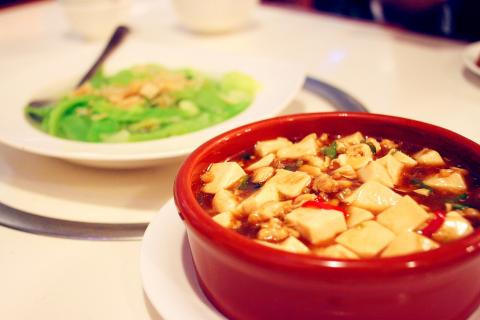Down a neon-lit thoroughfare, in a part of town better known for clandestine Japanese pubs, Ji Jia Zhuang (雞家莊) has been serving up homey, old-timey local fare for more than 40 years.
This is that rare kind of evergreen institution that has been around so long, just having a meal here feels like you’re sitting down with generations of Taipei residents, getting to know the city’s old soul. It helps that this part of Zhongshan District (中山) looks like it decided not to join us in the new millenium.
Occupying a three-storey building on Changchun Road (長春路), the restaurant can look a little intimidating at first, with decor reminiscent of both a barnyard and a banquet hall from the 1980s. The cornices resemble traditional Chinese roof tiles, and diners eat under the gaze of proud-looking roosters in figurines and in photographic portraits that adorn the walls.

Photo: Davina Tham, Taipei Times
Ji Jia Zhuang has gained some new followers since its inclusion in the Taipei Michelin Guide last year, but this doesn’t seem to have made it more self-conscious. It hasn’t bothered with an English name, nor does it have much of an online presence. But if given a stab at international branding, I’d pitch “Chicken Homestead.” In word and spirit, it’s an honest translation of Ji Jia Zhuang’s folksiness and achievements in poultry.
Unsurprisingly, chickens are the main draw of the menu. The restaurant uses only pullets that are five to six months old, as these are supposed to have the most tender meat. The cooked birds are on full display in a glass booth that juts partly out into the street, where a chef prepares the trio of cuts for our “three tastes chicken” (NT$600 to NT$800): smoked, poached and black Silkie.
The chicken thigh is only lightly smoked, almost resembling a roast, except that the flavorful meat is studded with tiny nuggets of chicken gelatin. The poached chicken looks similar, if paler, but tastes quite different as the fat hasn’t rendered out and is more pronounced in taste and texture.

Photo: Davina Tham, Taipei Times
In life, the Silkie is a supermodel of a chicken, with fine, long feathers that come in white, brown, black and even blue. In death, however, it has inky skin and almost ashen flesh. Although Ji Jia Zhuang’s version tends to sell out — Silkies are thought to be more nutritious than garden variety chicken — we get lucky on a weekday night with no reservation. The meat looks out-of-this-world, but at the end of the day, it’s just chicken.
This platter is served with pickled cabbage, ginger juice and sweet red chili, and often paired with a bowl of rice cooked in chicken broth (NT$50). I’ve had more perfumed versions from Hainanese chicken rice specialists, but this will do in a pinch.
A house special of stewed tofu with chicken (NT$298) arrives in a dish topped with a ceramic cockerel. The dish underneath looks ordinary, but packs a lot of umami.

Photo: Davina Tham, Taipei Times
The bird features in many other dishes, from the classic “three cups chicken” cooked in sesame oil, soy sauce and rice wine (NT$980) to chicken soup with mushrooms, clams or wintermelon (NT$150). Nothing goes to waste — feet are cooked with shredded bamboo (NT$278 to NT$380), and testicles either stir-fried (NT$380) or with pig’s kidney in sesame oil (NT$630 or NT$880).
But the menu also spans a wide range of local cooking, including seafood and luwei (滷味) braises. Deep-fried pig’s intestine (NT$420), laid out like slices of Peking duck, is crisp and unctuous in one bite. Chinese mustard with dried scallop (NT$380) balances out the heavy dishes.
We try to order a plate of caramel custard (NT$120), but the waitress tells us that we’ll get complimentary servings at the end, like every other table. The puddings arrive without any prompting, when she notices that we’ve stopped picking at the main dishes. They’re rich and eggy, with a caramel sauce that’s perfectly bittersweet.
One more thing about Ji Jia Zhuang — it has some of the best service I’ve encountered in a restaurant here, warm and attentive but never intrusive. The waitstaff, all middle-aged or older, are seasoned pros and a testament to the staying power of this institution, which is versatile enough for generations of locals as well as out-of-towners who have never had Taiwanese food.

June 2 to June 8 Taiwan’s woodcutters believe that if they see even one speck of red in their cooked rice, no matter how small, an accident is going to happen. Peng Chin-tian (彭錦田) swears that this has proven to be true at every stop during his decades-long career in the logging industry. Along with mining, timber harvesting was once considered the most dangerous profession in Taiwan. Not only were mishaps common during all stages of processing, it was difficult to transport the injured to get medical treatment. Many died during the arduous journey. Peng recounts some of his accidents in

“Why does Taiwan identity decline?”a group of researchers lead by University of Nevada political scientist Austin Wang (王宏恩) asked in a recent paper. After all, it is not difficult to explain the rise in Taiwanese identity after the early 1990s. But no model predicted its decline during the 2016-2018 period, they say. After testing various alternative explanations, Wang et al argue that the fall-off in Taiwanese identity during that period is related to voter hedging based on the performance of the Democratic Progressive Party (DPP). Since the DPP is perceived as the guardian of Taiwan identity, when it performs well,

A short walk beneath the dense Amazon canopy, the forest abruptly opens up. Fallen logs are rotting, the trees grow sparser and the temperature rises in places sunlight hits the ground. This is what 24 years of severe drought looks like in the world’s largest rainforest. But this patch of degraded forest, about the size of a soccer field, is a scientific experiment. Launched in 2000 by Brazilian and British scientists, Esecaflor — short for “Forest Drought Study Project” in Portuguese — set out to simulate a future in which the changing climate could deplete the Amazon of rainfall. It is

The Taiwan People’s Party (TPP) on May 18 held a rally in Taichung to mark the anniversary of President William Lai’s (賴清德) inauguration on May 20. The title of the rally could be loosely translated to “May 18 recall fraudulent goods” (518退貨ㄌㄨㄚˋ!). Unlike in English, where the terms are the same, “recall” (退貨) in this context refers to product recalls due to damaged, defective or fraudulent merchandise, not the political recalls (罷免) currently dominating the headlines. I attended the rally to determine if the impression was correct that the TPP under party Chairman Huang Kuo-Chang (黃國昌) had little of a